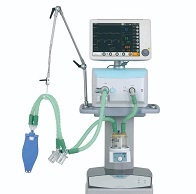Ventilator on Rent
Ventilator: An Overview
A ventilator is a medical device designed to provide mechanical ventilation by moving breathable air in and out of the lungs. This assists or replaces spontaneous breathing, making it crucial for patients who are unable to breathe adequately on their own. Ventilators are essential in various medical situations, especially in critical care settings, surgeries, and during recovery from severe respiratory conditions.
When is a Ventilator Used?
Ventilators are employed in multiple clinical scenarios, including:
Acute Respiratory Failure: When a patient’s lungs cannot provide sufficient oxygen to the blood or remove carbon dioxide efficiently.
Chronic Respiratory Disorders: Conditions like chronic obstructive pulmonary disease (COPD) or amyotrophic lateral sclerosis (ALS) where long-term support might be required.
Surgical Procedures: During major surgeries that involve anesthesia, ventilators ensure the patient receives adequate oxygenation.
Infections and Pneumonia: Severe cases that impair breathing, such as COVID-19-induced pneumonia, might necessitate ventilation.
Traumatic Injuries: Situations where chest or lung injuries hinder natural breathing mechanisms.
Ventilator on Rent
For patients who need short-term respiratory support, renting a ventilator can be a practical solution. Renting is particularly beneficial in scenarios such as:
Post-Surgery Recovery: Patients needing temporary respiratory support during recovery can benefit from renting a ventilator for home use.
Acute Health Crises: Short-term rental provides immediate support during sudden health declines or exacerbations of chronic illnesses.
Financial Constraints: Renting can be a cost-effective alternative to purchasing, reducing the financial burden for patients and families.
Home Care Transition: For patients transitioning from hospital care to home care, renting ensures continuity of support without a long-term commitment.
Ventilator rental services typically include delivery, setup, and training on the device’s use, along with ongoing support and maintenance, making it a feasible option for managing respiratory needs outside of hospital settings.



